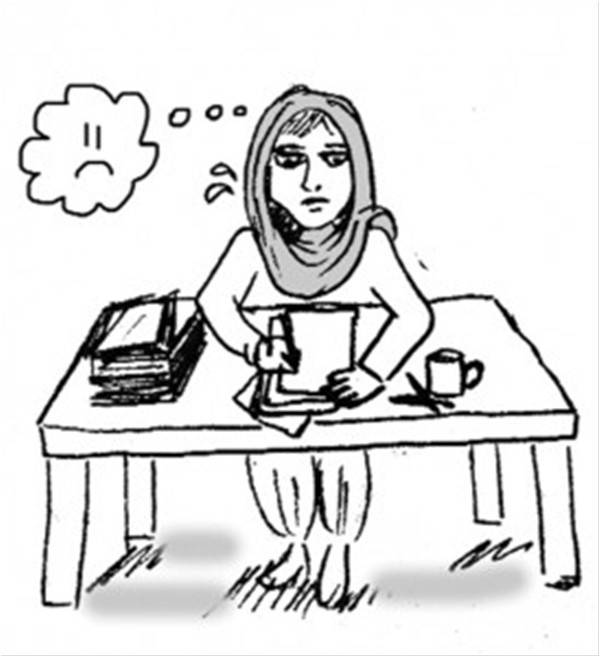
No answers
Sir,
When this country was made, it was made in the name of peace, in the name of Islam, in the name of freedom. The colour designated to this land – green – signified peace. But we did not realize the gradual transition of this green into red. Why did we not see? Why did we let this happen? Why did we let this land be tainted with blood? Why is it that a Pakistani’s blood is so cheap? A bullet here, a blast there and we die. Not one person, not a hundred, but tens of thousands. And all the government does is announce a three day mourning.
But we do not learn any lessons, we just forget. Why don’t we do anything? Why don’t we play our part in saving this country. There are so many questions, but no answers. Every night, before I go to sleep, I ask myself what my entire day was about? Why was it all about myself? Why did I only pay attention to my own little problems? We tend to forget our goal in life is not only to focus on ourselves, not only to study, earn and live for ourselves. This country needs us, these people, these victims of terror need us.
So lets us make an effort. Let us save this land. Let us start organizations, let us donate, let us spend time in orphanages, let us teach kids who do not go to school. Let us colour this land green again.
Zainab Mansoor,
Lahore.
Go girls
Sir,
Women are often denied the right set of circumstances for education in our society. Despite any gains we have made, girls continue to suffer severe disadvantages in our education system, and these limitations lead to a decreased family income, put the girls at risk, leave little avenues for socialization, and hurt our society’s progress in the long run.
Women have to play three roles in our society, and everyone expects them to fulfill these responsibilities in the best manner possible. They have to be mothers, daughters, and wives. Even for these traditional roles, they need education.
But women’s access to education has been accepted as a fundamental right the world over. It is believed that women’s education brings economic progress to poor communities, and impacts the health and economic future of a community as well as a nation.
Educated women can make more effective decisions for their families, and the skills they develop help improve the quality of their lives. They are aware of their rights and cannot be easily exploited. And that is the kind of strong, independent women that our society needs.
Anna Abid,
Lahore.
Combating crisis
Sir,
We are living in a time of immense crisis. Militancy and extremism have affected us all profoundly. In this situation, we feel it is vital that the media play a role in reshaping opinion and determining people’s behaviour towards each other.
The owners, operators and publishers of all TV channels, radio stations, newspapers, magazines and other media outlets need to run a campaign for one year to combat extremism. To achieve this, all TV channels must assign at least one hour of daily programming to material intended to combat extremist thoughts. Similarly, radio channels must assign 30 minutes to this cause, newspapers should devote a quarter page of ad space daily to anti extremist thought and the print and online media must also give editorial space to articles for this purpose.
We believe these actions could play a crucial role in helping to rebuild a nation that has been ravaged by bombs, bigotry and intolerance. A responsible media that unequivocally acts in the interest of people is our greatest need. Media outlets who engage in this will gain the much needed trust and goodwill of the people. We need the media to act today.
Amena S,
Islamabad.
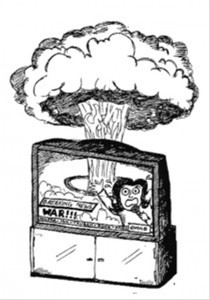
Cat call
Sir,
Man is the cruelest animal, according to Friedrich Nietzsche, an eminent German philosopher. His quote does ring true in the modern era where ruthless crimes rendered by man qualify as pinnacle of cruelty while kind deeds rendered by wild animals qualify as epitome of humanity.
Dwelling in a world full of treachery and suffering, as a grave repercussion of man’s evil actions, one cannot help admiring the act of kindness displayed by a Russian cat Masha, who has rightfully garnered a lot of appreciation for saving an abandoned baby by warming him in her furs when the temperature was well below zero degrees. The cat has done more than saving the baby’s life; it has shed off the facades of love and kindness that man proudly boasts of. It has compelled us to ponder over our notions that man may be the crown of creations. He may possess a higher degree of rational cognition than animals, but what use is that cognition when it is not employed for a noble cause and instead is sapped in the scheming of baneful deeds.
The act of kindness rendered by Masha needs to be contrasted with the act of ruthlessness rendered by man, by those who claim to be human beings. One instance is the horrendous killing of little innocent children in the terrorist attack on the Army Public School in Peshawar.
Only a couple of days ago, the body of a five year old boy was found hanging in mosque after he was physically abused. Such cases of violence against children are not rare in Pakistan. The pinching fact is that effective policy measures are not taken to curb them, and even if they are, they fail to be executed effectively.
Our leader need to take charge and protect our children, instead of arguing over petty political differences. I seriously wonder if the responses of our leaders would have been the same had their own children been susceptible to such dangers.
We can compromise on everything but one thing that is well beyond the limits of compromise for every Pakistani, for every human in fact, is any threat to our children’s lives and well being.
We need to learn from the heartening display of humanity by Masha the cat. There is a need for all human beings to introspect and to reassess their failures, consequently bettering not only their own lives but also the live of those around them.
Marria Qibtia Sikandar Nagra,
Lahore.
Have faith
Sir,
The attribute of insecurity in an individual’s personality is a combination of lack of trust and confidence in his or her own being. This attribute is found in all age groups, ranging from childhood to adolescence and beyond. Many times, this sense of insecurity grows larger when a person ages as fears of losing the loved ones, possessions and other acquisitions creeps in. At other times, a person becomes more mature as he or she ages; and becomes capable of coping with insecurities effectively.
The feeling of insecurity exists at the domestic, personal and professional level. The feeling prevalent at the domestic and personal level involves instances of relationship management, which inculcates fears, thwarts confidence and trust regarding different relationships. It eventually spoils the relationship dynamics.
At the professional level, the feeling of insecurity prevails amongst the subordinates, fellow colleagues and peers. They fear the loss of their jobs, recognition and esteem in the workplace. Such feelings of insecurity are largely attributed to communication barriers, low level of self-efficacy in a person, and over indulgence in rivalries and competition. The feelings of insecurity distort one’s personality, and impede the effective utilization of one’s interpersonal skills.
Considering the adverse implications of insecurity residing in one’s personality, there stands a need to overcome this attribute. This can be well managed by holding a firm faith and by trying to raise self confidence and self trust. Not holding undue expectations from different relationships, and learning to manage relationships in a balanced way, aid in overcoming the sense of insecurity amongst individuals.
In addition, overcoming communication gaps amongst individuals, engaging in positive and healthy competition, and not imitating practices and values crazily are other positive initiatives for managing insecurity.
Aiyza Javaid,
Lahore.
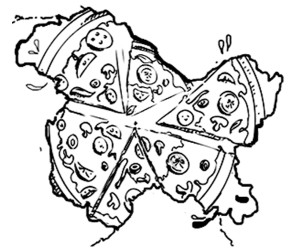
Kashmir conundrum
Sir,
I recently read a Bengali translation of an article by renowned Indian journalist, writer and diplomat Kuldip Nayar on the Kashmir problem, in Bangladesh Pratidin.
Mr Kuldip Nayar has said Jawaharlal Nehru was interested in resolving the Kashmir issue, but I beg to differ with him. Mr Nehru convinced the last British viceroy Lord Mountbatten to put the Gurdaspur district of Punjab in India. At that time, 80% of the population of Gurdaspur was Muslim. Gurdaspur had the only road connection with the mountainous Kashmir from Indian main land. This indicates that Mr Nehru had a motive on the Kashmir matter before 14th August, 1947. India was partitioned based on the two nation theory, ie the Hindu majority portion of the subcontinent would constitute India and the Muslim majority portion would constitute Pakistan. Hyderabad was a large estate and its ruler was Muslim. It even applied for the membership of the United Nations. India attacked Hyderabad in September 1948, the day Muhammad Ali Jinnah, the governor general of Pakistan, died.
In Kashmir, 80% of the population was Muslim but the ruler was Hindu. Mr Jawaharlal Nehru vehemently opposed the involvement of the United Nation forces when Muslim League made such a proposal. Lord Mountbatten was supposed to be impartial and neutral, and being a viceroy even tried to persuade Jinnah to be the first prime minister of undivided India. His daughter Pamela Mountbatten wrote in her book India Remembered that Nehru wanted to visit the Kashmiri Maharaja along with Lord Mountbatten. Mountbatten avoided that. But his messages were passed along, and as a result Maharaja Hari Singh left the idea of an Independent Kashmir and signed the agreement to join India. After 14th August, Lord Mountbatten became the Governor General of India and his British Army general became the Chief of Armed Forces of both the countries, which helped the Indian Army stay in Kashmir.
Jinnah was hopeful to achieve a viable Pakistan, but because of the interference of Lord Mountbatten, and due to Congress and Jawaharlal Nehru, many vital parts of Pakistan were given to India.
East Timor was a part of Muslim Indonesia. A majority of its population is Christian. They wanted independence from Indonesia. The government of Indonesia held a plebiscite, and when a majority voted for an independent East Timor, Indonesia given them independence.
Scotland also wanted independence. The British government recently held a plebiscite in Scotland, and a majority voted in favor of remaining within the United Kingdom.
Malaysia is a Muslim country and Singapore was a part of Malaysia. But Singaporeans are mostly Chinese. They wanted to be an independent country. Malaysia did not oppose that, and gave them independence. Singapore and Malaysia are now prosperous nations and are maintaining the best of relations.
Why India is refusing to hold a plebiscite in Kashmir then?
Syed Moazzem Hussain,
Dhaka.
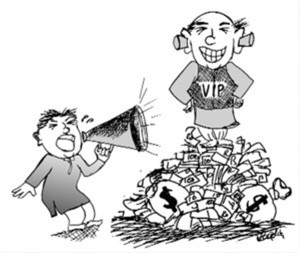
Business of politics
Sir,
The politics of Mohammad Ali Jinnah and Allama Muhammad Iqbal were driven by ideologies. Their motive was to serve the people. But after their demise, evacuee property was plundered through fake claims, and the bureaucracy declined to accept the change that in a sovereign independent country, state resources, land and assets should be dedicated for welfare of the most deprived, not to be doled out to buy loyalties of natives, as was the practice during the British Raj.
Then came Ayub Khan, imposing a martial law, burying Jinnah’s concept of a democratic welfare state with such schemes as bonus vouchers, enticing politicians without principles to build business empires in return for pledging loyalty to him. Those were the days when state funds started officially being plundered.
Individuals grew from rags to riches, tax evasion and corruption became institutionalized, and those entrusted with making policies betrayed their motherland, seeking foreign nationalities, while Pakistan became a transit place to make quick bucks and conveniently transfer them to foreign safe havens.
Corruption is accepted as a perk of power. When the US imposed an embargo on the sale of F16s to Pakistan, Islamabad had paid $500 million of the total $650 million, but we were told that balance due was $150 million plus $30 million for administrative expenditure – a name for commissions paid to those who matter and cannot be held accountable. Conveniently, there was no penalty in the one sided agreement for delays.
While Pakistan’s foreign reserves depleted and state owned enterprises like PIA, Railways, and Pakistan Steel Mills were driven to bankruptcy, individual and institutional corporate interests multiplied but debts mounted. The country’s security was in tatters, with terrorism threatening the state from within, and elite housing societies replacing green belts around every major city.
Tariq Ali,
Lahore.
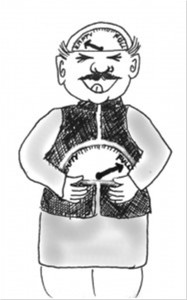
Road to nowhere
Sir,
It takes no rocket science to figure out how much petrol we consume and how much we need to store, provided those at the helm have the time to devote to these most basic tasks.
Defaults in payment by state institutions and business houses to PSO are a failure of governance. Our political leadership is responsible for this crisis, because it is he who selected these wizards and gave them responsibilities for which they either do not qualify, or they are not their priority, because they are too busy in other ventures. There are accepted international norms and ethics, such as Conflict of Interest rules, whose enforcement is essential for good governance. Regulatory control is one of the most vital constitutional functions of any government. Unfortunately regulation and public interest is bound to be a casualty if those appointed to regulate are traders for whom profit alone is the objective.
Public interest seems to be the lowest priority of every government that has been in power for the last thirty years. The net result of such callous abuse of power is visible in the collapse of state institutions. Energy shortage, collapse of public transport (air, rail or road), a dysfunctional health and education system, and failure to enforce the writ of law through strict deterrence, haunts 200 million citizens of Pakistan.
Greed for power and money is defiantly dominant among our policymakers. Terrorism, which threatens our national security today, is a self inflicted cancer, just like all other ills in this country. Solution lies solely in the enforcement of law and constitution, deliverance of justice, accountability and appointments strictly on merit, with no tolerance for bribery and crime.
Ali Malik,
Lahore.

